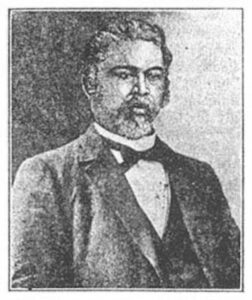
George Lisle
*The birth of George Liele is celebrated on this date in 1752. He was a Black pastor.
George Liele was born into slavery in Virginia and taken to Georgia. As an adult, he was converted by Rev. Matthew Moore of Burke County, Georgia, in 1777. He continued to worship in Moore’s white church for four years until Savannah was evacuated by forces loyal to Britain. His master, Henry Sharp, encouraged him in his preaching to other slaves.
Sharp freed Liele, a Baptist and Loyalist, before the American Revolutionary War began. Sharp died in the battle as a Tory major in 1779. Liele then went to Savannah, Georgia, where he helped organize another Baptist congregation. Liele chose to leave with the British to ensure his freedom rather than risk enslavement in the American South. He migrated to Jamaica with his wife, Hannah, and their four children. He preached in Kingston, Jamaica, where the novelty of a Black itinerant ex-slave preacher attracted considerable attention. Liele soon gathered a congregation and purchased a piece of land about a mile from Kingston, where he built a chapel. To support and expand his work, Liele sought support from London.
He was helped in this endeavor by Moses Baker, an Afro-European barber who arrived in Jamaica from the United States in 1783. He converted to Christianity and was baptized by Liele. A Quaker invited Baker to live on his estate and instruct the slaves in 'religious and moral principles. To expand this educational work, Baker approached benefactors in Britain. He contacted the Baptist John Ryland, who became interested in securing funds from British donors to meet such demand for missionary work. He helped instigate the non-denominational London Missionary Society, though the Baptists funded his first missionary.
His achievements were limited since he died early. Later, in the early 19th century, a trio of Baptist missionaries from Britain was more successful in supporting local African Baptist congregations and helping them develop their international links. They met fierce resistance from white planters who had great influence in the Jamaican House of Assembly and had provided adequately for their own spiritual needs with the Anglican Church. They opposed education and the Baptists' congregational governance ideas from being introduced among their slaves. In 1792, Liele wrote the church covenant, which served a dual purpose for the Ethiopian Baptists of Jamaica. First, it was a shared teaching tool to instruct Baptists about commonly shared principles from the Scriptures; secondly, it comforted slaveholders, ensuring that their slaves would be law-abiding.
The church covenant was shown to members of the legislature, the magistrates, and justices to secure their approval that they might permit their slaves to become congregation members. In addition to preaching the gospel, Lisle also educated the slave population. He founded schools for negroes in conjunction with his churches, a new concept in Jamaica. In 1822, Lisle, of First Bryan Baptist Church and the First African Baptist Church in Savannah, Georgia, paid a visit to England; he died four years later in 1826. He is buried in an unmarked grave somewhere in Kingston, Jamaica.